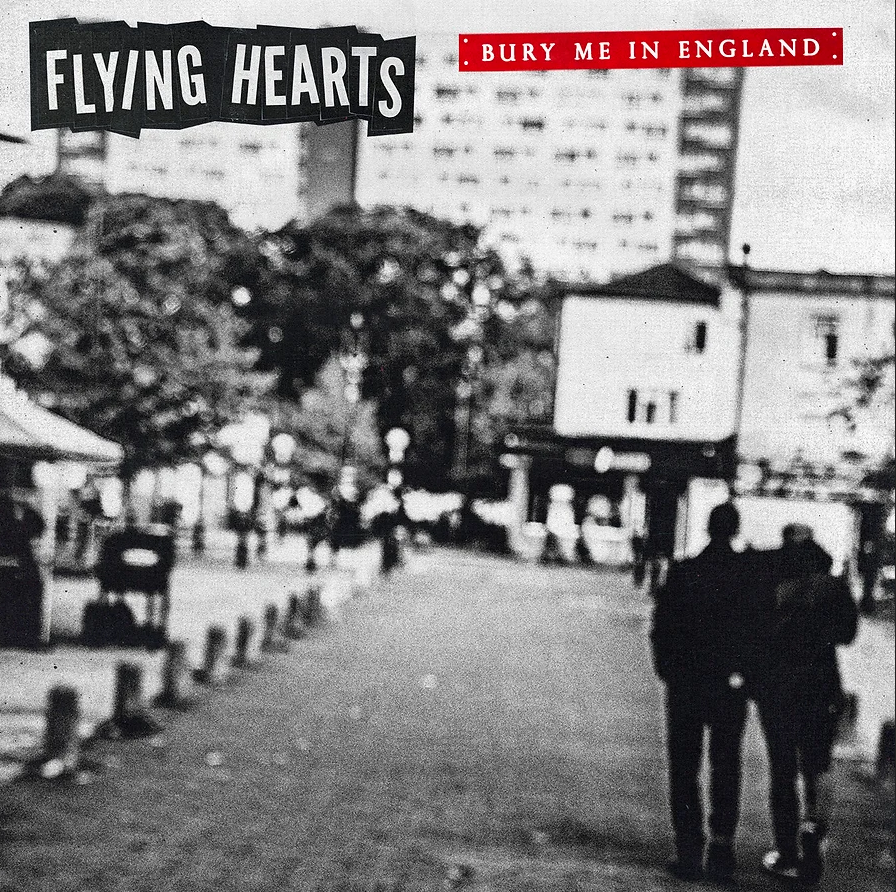This week, Mighty Jupiter & The Mooncake Band sat down with us to discuss the sonic and thematic layers of their latest LP, Forced Fun For the Just OK Life. In this interview, they delve into their unique genre, Shoehaze, blending shoegaze, punk, and blues rock, and share their perspectives on navigating societal expectations, embracing a DIY ethos, and finding creative inspiration in Latvia. From crafting atmospheric soundscapes to balancing introspection with rebellion, the band unpacks the core message behind their music: a call to challenge the “just okay” life and reclaim authenticity.
Mighty Jupiter & The Mooncake Band, thanks for sitting down with us to discuss your ethos and art. There is so much to unpack, sonically, thematically and titularly, with your album, ‘Forced Fun For the Just OK Life’. For new fans who have stumbled upon the LP, what should they know about you and the release?
Thanks for having us! Forced Fun For The Just OK Life isn’t just an album. It’s a look at the weirdness of the world. It talks about the quiet pressure to fit in, to put on a smile when you’re not feeling it, and to join in activities you’re told to enjoy, even if they seem empty.
Musically, it mixes baroque pop, blues rock, punk, indietronica, and shoegaze, creating a sound we call shoehaze—a dreamy yet down-to-earth vibe. Each song shares its own tale, exploring ideas of strength, disappointment, complicated relationships, and the quest for meaning in a chaotic world.
We hope listeners will start questioning the expectations placed on them, and maybe even find a bit of rebellion to challenge the “just okay” life.
While most artists of this generation are content assimilating shoegaze pioneers and repackaging the vortexical tonal alchemy under the premise of their own ingenuity, you’re at the vanguard of innovation with your unique brand of ‘Shoehaze’. Can you tell us more about how you conceived the genre?
Shoehaze wasn’t something I planned to create; it developed naturally as I mixed different influences into something new and interesting. Our mastering engineer, Natalie Bibby, coined the name while we were finishing the album. She captured the essence of what we were doing—a dreamy, layered sound that feels like shoegaze but with a modern twist—and that’s how Shoehaze started.
For me, it’s more of a creative approach than a strict type of music. It’s about bringing together atmospheric sounds with strong melodies, detailed arrangements, and raw energy. We blend in different genres, letting each song stand out while creating a rich, immersive sound. It’s a mix of being down-to-earth and otherworldly, reflecting the strange contradictions in life. Shoehaze perfectly describes this balance between depth, chaos, and melody.
There’s something so effortlessly organic about the experimentation in your sound. What’s the secret?
Thank you—that means a lot to hear! Honestly, the secret is that I stopped trying to fit into exact genres or subcultures a long time ago. I’ve embraced the idea of creating songs as they come—some lean into a rock vibe, others take on orchestral textures, and some sit somewhere in between. For me, the key is making sure everything feels organic and cohesive. If it sounds solid and true to itself, I know I’m on the right path.
Not every song makes it to the final cut, though. I typically have 40-60 tracks in progress at any given time, tossing them around to see how they evolve—both individually and together. From there, I narrow it down to 10-15 tracks that not only work as stand-alone pieces but also tell a cohesive story as an LP.
Of course, my background plays a huge role in shaping this process. I’ve been playing and composing music for over 25 years, working across everything from loud rock tracks to intricate orchestral arrangements. I’ve also done sound design and even foley work for commercials and movies. All of that experience has given me a unique perspective on how to experiment while staying grounded in what feels authentic and resonant. It’s less about fitting into a mold and more about letting the music find its own shape.
How does the concept of “forced fun” reflect your personal experiences, and do you find that your own struggles with social expectations inspired the more sardonic undertones that thread through your music?
The concept of “forced fun” is deeply personal to me, and it reflects my own experiences navigating the tension between the desire to connect and the pressure to conform. Sarcasm is my coping mechanism—a sharp but careful tool I use to process and critique those social scripts. It’s not bitterness or sardonicism, though. I try to stay on the lighter side of that very fine line. While some of my lyrics might feel sardonic, I see them as sharp sarcasm—a way to highlight the absurdity of social expectations without losing hope or humanity.
My life experiences naturally shape my songwriting. Music has become my way of digesting not-so-pleasant moments and making sense of how they’ve shaped me. I don’t see myself as special—I’ve just found music to be the most authentic way to process and express those struggles. If I had to pick a song that captures my life path, it would be Nothing Like You by Cock Sparrer. It perfectly encapsulates the turbulence of clashing with societal expectations and personal battles.
With Forced Fun For The Just OK Life, I wanted to explore how societal scripts can erode individuality and lead to disconnection. It’s about questioning the “just okay” life and finding a way back to authenticity. Even when the themes are heavy, the biting humor and sarcasm help make the confrontation feel more human and relatable—because sometimes, the best way to survive the absurd is to laugh at it.
Your lyrics balance melancholy and rebellion in a way that feels simultaneously reflective and upfront. When you look back at songs like ‘The Lake’ or ‘Super Me’, how do you remember the exact moment of creative spark, and did you find there was any conflict between wanting to be brutally honest and still making something that resonates with listeners?
Thank you for noticing that balance—it’s something I strive for. With songs like The Lake and Super Me, the creative spark came from very different emotional spaces. The Lake was born out of a quiet moment of renewal, standing by an ancient, frozen lake in winter. It was deeply reflective, almost meditative, and the music followed that mood naturally. On the other hand, Super Me came from a place of raw energy—a need to push back and reclaim a sense of agency. It’s more upfront, almost defiant, which is where its power lies.
There’s always a bit of conflict between being brutally honest and creating something that resonates. I don’t want to shy away from hard truths, but I also want to leave room for interpretation—so listeners can find their own meaning in the songs. The challenge is to keep the honesty intact without letting it overshadow the universality of the emotions. With both tracks, it was about striking that balance: staying true to my experiences while crafting something others could see themselves in. Honesty, after all, doesn’t have to be isolating—it can be the bridge that connects us.
There’s a distinctive dynamic between introspective calm and unfiltered edginess in Forced Fun For The Just OK Life. Were these shifts intentional from the very beginning, or did they emerge naturally as you pieced the record together?
The dynamic between introspective calm and unfiltered edginess wasn’t something I planned from the very start—it emerged naturally as the album came together. I usually work with a large pool of songs, and as I narrow them down, patterns and contrasts start to reveal themselves. Forced Fun For The Just OK Life reflects the push and pull of life itself—moments of quiet reflection intertwined with bursts of raw emotion.
Some tracks, like The Lake, came from a place of serenity and renewal, while others, like Unfolded, were driven by a raw urgency to confront personal and societal chaos. These shifts weren’t forced; they were just honest reflections of the different emotional states I experienced while writing. As the songs evolved, it became clear that these contrasting moods were integral to the story I wanted to tell—a narrative about the chaos, absurdity, and occasional clarity of modern existence. The balance felt natural, almost inevitable as if the album demanded it.
You’ve embraced a totally DIY ethos—from writing and recording to production and release. Has this hands-on approach ever forced you to reconsider how you define success within the industry, especially when time and resources become a juggling act?
Absolutely, embracing a DIY ethos has completely reshaped how I define success in the industry. When you’re responsible for everything—from writing and recording to production and release—you quickly realize that success can’t just be measured by numbers or industry accolades. Instead, it’s about creating something authentic that resonates deeply with people on a personal level.
The biggest challenge is navigating limited time and resources. There have been moments when I’ve had to make the most out of almost nothing—scraping by on a few pennies and stretching every ounce of creativity to make it work. With so many moving parts, prioritizing the core vision becomes essential, trusting that everything else will eventually align.
But there’s also freedom in this approach—no external constraints, just pure creative exploration. For me, success is when the music feels genuine, complete, and finds a connection with listeners that mirrors the heart and effort behind it.
The Latvian music landscape isn’t often placed under the international spotlight. How has your home base influenced your creative approach, and do you feel there’s any advantage to working somewhat outside of the more typical indie circuits?
The Latvian setting itself has influenced my music in subtle but significant ways. The environment—vast forests, foggy winters, and a sense of quiet introspection—naturally reflects in the atmospheric and layered elements of my work. When it comes to the industry, there are definite advantages, like a lower level of competition—you don’t have to battle for venue slots that much. And the recording infrastructure here is excellent; Riga has some top-notch studios with incredible equipment and personnel. It’s a fantastic base for creating music.
However, at a certain point, you realize the need to break beyond the local scene. Being outside the usual indie circuits can make global recognition more challenging. That’s what we’re focused on now—reaching out to labels, booking agencies, and festivals across Europe and the US to take our music to the next level.
Finally, if you could sum up the core message that you want listeners to walk away with after hearing Forced Fun For The Just OK Life, how would you phrase it?
The core message of Forced Fun For The Just OK Life is about reclaiming your humanity in a world that often demands you lose it. It’s a call to question the roles we’re expected to play, to see the absurdity in hollow norms, and to push back against the “just okay” life. Ultimately, it’s about finding authenticity, embracing resilience, and remembering that even in chaos, there’s room for hope, humor, and meaningful connection.
Stream Mighty Jupiter & The Mooncake Band’s Forced Fun For the Just OK Life’ LP on Spotify and connect with the band on Instagram.
Interview by Amelia Vandergast



